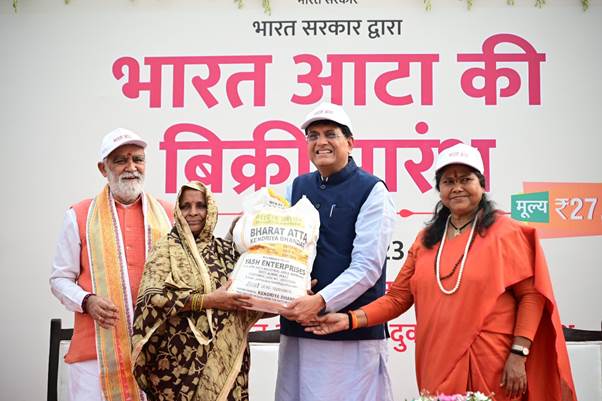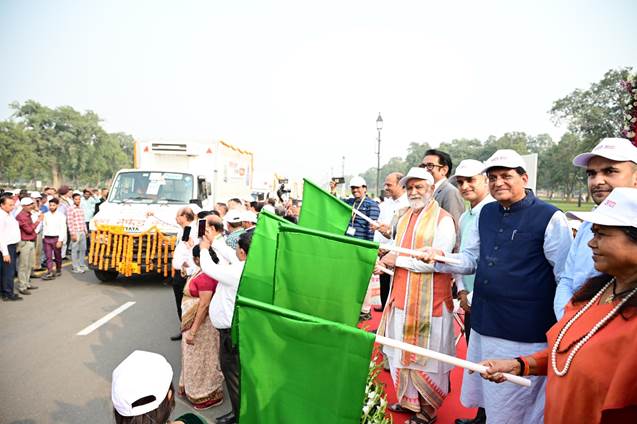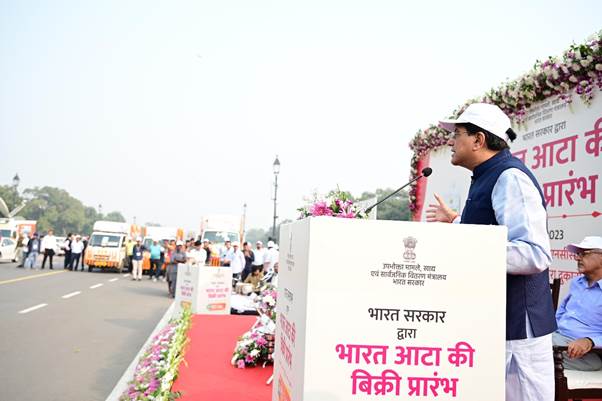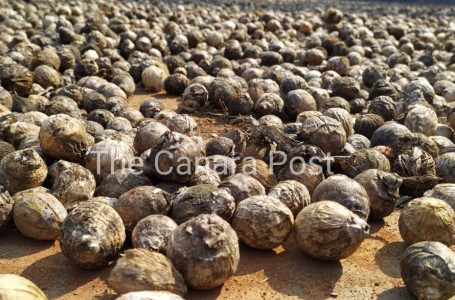Centre launches sale of ‘Bharat’ Atta at an MRP of ₹ 27.50/Kg


New Delhi, Nov 07, 2023: The Union Minister for Consumer Affairs, Food and Public Distribution, Textiles and Commerce and Industry Piyush Goyal flagged off 100 mobile vans for sale of wheat flour (Atta) under ‘Bharat’ brand, on Nov 6 from Kartavya Path, New Delhi. The atta will be available at an MRP not exceeding ₹ 27.50/Kg.
This is the latest among a series of steps taken by the GoI for the welfare of ordinary consumers. The launch of retail sale of ‘Bharat’ brand Atta will increase supplies in the market at affordable rates, and will help in continued moderation of prices of this important food item.
‘Bharat’ Atta will be available at all physical and mobile outlets of Kendriya Bhandar, NAFED and NCCF from today and will be expanded to other co-op/retail outlets.
2.5 LMT of wheat @ Rs.21.50/kg has been allocated for Semi-Government and cooperative organizations i.e. Kendriya Bhandar, NCCF and NAFED under Open Market Sale Scheme [OMSS (D)] for converting to atta and offer it for sale to the public under ‘Bharat Atta’ brand at an MRP not exceeding ₹ 27.50/Kg.
Speaking on the occasion Goyal said that Centre’s intervention has stabilised price of essential commodities. He said that various measures were taken in the past with regard to Tomato and Onion to cool off prices. In addition, the Centre is also providing Bharat Dal at Rs. 60 per kg through Kendriya Bhandar, NAFED and NCCF to provide relief to consumers.

He added that all these efforts have also benefitted farmers a great deal. Goyal said that the produce of farmers is being purchased by the Centre and thereafter, is being provided to the consumers at a subsidised rate. He stressed that Centre’s intervention has led to stabilise prices of various commodities. He said that Prime Minister Narendra Modi has the vision to help the consumers as well as the farmers.
BACKGROUND:
The Government of India has taken a series of steps to stabilize the prices of essential food grains while also ensuring fair price to the farmers.
Bharat Dal (Chana dal) is already being sold by these 3 agencies @ Rs.60 per kg for 1kg pack and Rs.55 per kg for 30 kg pack from their physical and/or retail outlets, along with onions @ Rs.25 per kg. Now, with the launch of sale of ‘Bharat’ Atta, consumers can get Atta, dal as well as onions from these outlets at fair and affordable prices.
Policy interventions of GoI aim to benefit farmers as well as consumers. For the farmers, GoI fixes MSP (Minimum Support Price) of foodgrains, pulses as well as coarse grains and millets. Nationwide procurement operations are undertaken to implement the PSS (Price Support Scheme) which ensures the benefit of MSP to farmers. In RMS 23-24, 262 LMT of wheat was procured from 21.29 lakh farmers at the declared MSP of Rs.2125 per quintal. The total value of procured wheat was Rs.55679.73 crores. In KMS 22-23, 569 LMT of rice was procured from 124.95 lakh farmers at the declared MSP of Rs. 2060 per quintal for Grade ‘A’ paddy. The total value of procured rice was Rs. 1,74,376.66 crores.
The procured wheat and rice is offered completely free of cost under Pradhan Mantri Garib Kalyan Anna Yojana (PMGKAY) through a network of about 5 lakh FPS in the country to about 80 crore PDS beneficiaries. Further, about 7 LMT of coarse grains/millets were also procured at MSP and distributed under TPDS/Other Welfare Schemes in 22-23.
Many measures are taken for the benefit of ordinary consumers who are not covered under TPDS. Sale of ‘Bharat Atta’, ‘Bharat Dal’ and tomatoes and Onions at affordable and fair prices is one such measure. So far, 59183 MT dal has already been sold, benefitting ordinary consumers.
Food Corporation of India (FCI) is conducting Nationwide weekly e-auctions for sale of wheat under OMSS(D). Only wheat processors (Atta chakkis /roller flour mills) can participate in these weekly e-auctions. FCI is offering FAQ and URS Wheat for sale @Rs. 2150 and 2125 per quintal respectively, in accordance with the prices fixed by Government. Traders are not allowed to participate in the e-auction as the intent of the Government is to ensure that purchased wheat is directly processed and released to ordinary consumers at affordable prices. Each bidder can take upto 200 MT in the weekly e-auction. FCI is offering 3 LMT of wheat for sale in the weekly e-auctions under OMSS(D). So far, 65.22 LMT of wheat has already been released into the open market by FCI as per Government directions.
Government of India has significantly increased the total amount of wheat to be offered for sale under OMSS (D) to 101.5 LMT till March 2024, instead of 57 LMT till December 2023 as part of a series of measures taken to moderate wheat prices. A significant decision has been taken to offload a further quantity of upto 25 LMT (over and above 101.5 LMT) of wheat from the buffer stock, if needed, by 31.3.2024.
Export of wheat has already been banned in order to ensure sufficient domestic availability of this commodity. Government has also imposed limits on stock holding of wheat by different categories of entities like wholesalers/traders, processors, retailers and big chain retailers, to prevent hoarding. Stock holding of wheat is being monitored on a regular basis, so as to ensure that wheat/atta is released into the market by traders, processors and retailers on a regular basis, and there is no stockpiling/hoarding. These steps are taken to check increase in the market prices of wheat by increasing its supplies.
Government has also banned export of non- basmati rice and imposed a floor price of USD 950 for export of Basmati rice. Under OMSS(D) FCI is offering 4 LMT of rice for sale in the weekly e auctions, to increase availability of rice in the domestic market. FCI is offering Rice for sale @Rs. 29.00-29.73/ Kg in accordance with the prices fixed by Government.
Government has shown unwavering commitment for welfare of sugarcane farmers as well as domestic consumers. On one hand, with payment of more than ₹ 1.09 lakh crores to farmers, more than 96% cane dues of last sugar season have already been paid leading to the lowest cane dues pendency in the sugar sector history. On the other hand, Indian consumers are also getting one of the cheapest sugar in the world. While global sugar prices are touching 13 years high with increase of about 40% in one year, retail prices of sugar in India have just 2% inflation in last 10 years and less than 5% inflation in last one year.
Government of India is closely monitoring the domestic retail prices of edible oils to ensure that the full benefits of decrease in international prices is passed on to the end consumers. Government has taken following measures in order to control and ease the prices of edible oils in the domestic market: –
- The Basic Duty on Crude Palm Oil, Crude Soyabean Oil and Crude Sunflower Oil was reduced from 2.5% to Nil. Further, the Agri-cess on these Oils was brought down from 20% to 5%. This duty structure has been extended upto 31st March, 2024.
- The Basic Duty on Refined Soybean oil and Refined Sunflower Oil was reduced to 17.5% from 32.5% and the Basic Duty on Refined Palm Oils was reduced from 17.5% to 12.5% on 21.12.2021. This duty has been extended up to 31st March, 2024.
- In order to maintain availability, the Government has extended the free import of Refined Palm Oils till further orders.
- In the latest initiative taken by the Government, the import duty on Refined Sunflower Oil and Refined Soybean Oil has been reduced from 17.5% to 12.5% with effect from 15.06.2023.

The international prices of major Edible oils such as Crude Soybean Oil, Crude Sunflower Oil, Crude Palm Oil and Refined Palm Oils are showing a decreasing trend since last year. Due to continuous efforts made by the Government to ensure that the decrease in the international prices of edible oils get passed on fully in the domestic market, the retail prices of Refined Sunflower Oil, Refined Soybean Oil and RBD Palmolien have decreased by 26.24%, 18.28% and 15.14% as on 02.11.2023 respectively over a year.
Department of Consumer Affairs monitors the daily retail and wholesale prices of 22 essential food commodities through 545 price monitoring centres set up in 34 States/UTs. The daily report of prices and indicative price trends are duly analysed for taking appropriate decisions for release of stocks from the buffer to cool down prices, imposition of stock limits to prevent hoarding, changes in trade policy instruments like rationalization of import duty, changes in import quota, restrictions on exports of the commodity etc.
Price Stabilization Fund (PSF) has been set up to check the volatility in the prices of agri-horticultural commodities in order to mitigate the hardships faced by consumers. The objectives of PSF are (i) to promote direct purchase from farmers/farmers’ associations at farm gate/mandi; (ii) to maintain a strategic buffer stock to discourage hoarding and unscrupulous speculation; and (iii) to protect consumers by supplying such commodities at reasonable prices through calibrated release of stock. The consumers and farmers are the beneficiaries of the PSF.
Since the inception of Price Stabilisation Fund (PSF) corpus in 2014-15 till date, the Government has provided budgetary support of Rs.27,489.15 crore for providing working capital and other incidental expenses for the procurement and distribution of agri-horticultural commodities.
Currently, under the PSF, dynamic buffer stock of pulses (Tur, Urad, Moong, Masur and Gram) and onion are being maintained. The calibrated release of stocks from pulses and onion buffer have ensured availability and affordability of pulses and onion to the consumers and purchase for such buffer has also contributed to providing remunerative prices to farmers of these commodities.
In order to check the volatility in prices of tomato and make it available to the consumers at affordable prices, the Government had procured tomatoes under Price Stabilisation Fund and is made it available at a highly subsidised rate to consumers. The National Cooperative Consumers Federation (NCCF) and National Agricultural Cooperative Marketing Federation (NAFED) has procured tomato from mandis in Andhra Pradesh, Karnataka and Maharashtra and making it available at affordable prices in major consuming centres in Delhi-NCR, Bihar, Rajasthan, etc. after subsidizing the price to the consumers. The tomatoes have been disposed initially at retail price of Rs.90/- per kg which has been reduced successively to Rs.40/kg for the benefit of consumers.
In order to check the volatility in prices of onion, the Government maintains onion buffer under the PSF. The buffer size has been increased year after year from 1.00 LMT in 2020-21 to 2.50 LMT in 2022-23. The onions from the buffer are released in major consumption centres during the lean season from September to December in a calibrated and targeted manner to cool down prices. The onion buffer target for 2023-24 has been enhanced further to 5 LMT. The disposal of onion from the buffer in major markets where prices have increased has commenced. As on 28.10.2023, about 1.88 LMT has been dispatched to destination markets for disposal. Further, Government has decided to procure 2 LMT additional Onion for PSF buffer during 2023-24 over and above 5.00 LMT already procured. The Govt. has imposed Minimum Export Price (MEP) of $800 per ton on onion on 28.10.2023 to check price rise and improve supplies in the domestic market.
To augment domestic availability and moderate the prices of pulses, import of tur and urad have been kept under ‘Free Category’ till 31.03.2024 and import duty on masur has been reduced to zero till 31.03.2024. Import duty of 10% on tur has been removed to facilitate smooth and seamless imports.
To prevent hoarding, stock limits has been imposed on tur and urad under the Essential Commodities Act, 1955 till 31.12.2023.
Stocks of chana and moong from the Price Support Scheme (PSS) and Price Stabilisation Fund (PSF) buffer are continuously released in the market to moderate prices. Chana is also supplied to the States at a discount of Rs.15/kg for welfare schemes.
Further, the government introduced the mechanism to convert chana stock into chana dal for retail disposal under the brand name of “Bharat Dal” at highly subsidized rate of Rs.60/kg for 1kg pack and Rs.55/kg for 30kg pack in order to make pulses available to consumers at affordable prices by converting chana stock of the government into chana dal. Bharat Dal is being distributed through retail outlets of NAFED, NCCF, HACA, Kendriya Bhandar and Safal. The chana dal, under this arrangement, is also made available to state governments for supplies under their welfare schemes, police, jails, and also for distribution through the retail outlets of state government-controlled cooperatives and corporations.
GoI stands committed to ensure the welfare of its farmers, PDS beneficiaries as well as ordinary consumers by ensuring minimum support prices for farmers, free rations (wheat, rice and coarse grains/millets) under PMGKAY for Antyodaya and Priority households and fair and affordable rates of wheat, atta, dal and onions/tomatoes as well as sugar and oil, for ordinary consumers.





